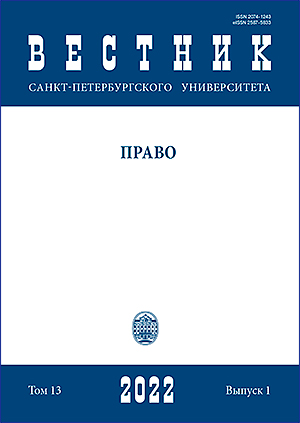Characteristics and problems of the termination of the employment relationship with the teaching staff for committing immoral act or harassment
DOI:
https://doi.org/10.21638/spbu14.2022.116Abstract
In the process of carrying out their professional activities, pedagogical workers are assigned special responsibility for the spiritual, moral, and patriotic education of students The Federal Law “On Education in the Russian Federation” defines “upbringing” as an activity aimed at personal development, creating conditions for self-determination, and socialization of a student on the basis of socio-cultural, spiritual, and moral values and socially accepted rules and norms of behavior in the interests of the person, family, society, and the state. This article summarizes basic requirements and restrictions on persons applying for teaching posts. The circle of persons who can be dismissed for committing immoral misconduct is determined. Issues related to the definition of immoral misconduct and harassment are considered. Peculiarities and problems of the termination of labor relations with a pedagogical worker for committing immoral misconduct incompatible with the continuation of pedagogical work (paragraph 8 of part 1 of Article 81 of the Labor Code of the Russian Federation) are considered. Attention is also drawn to peculiarities of dismissing a teacher for his application, including one-time, of the method of education associated with physical and (or) psychological violence against the student’s personality (Clause 2 of Article 336 of the Labor Code of the Russian Federation). The relevance of the topic raised by the author, on the one hand, is determined by considerable scholarly interest, and on the other hand, is of great practical importance in determining the procedure for terminating labor relations with teachers for committing an immoral misconduct. However, a comprehensive study on this topic by legal scholars in recent years has practically not been conducted.
Keywords:
disciplinary liability, dismissal, morality, immoral misconduct, harassment, teachers, education
Downloads
References
Downloads
Published
How to Cite
Issue
Section
License
Articles of "Vestnik of Saint Petersburg University. Law" are open access distributed under the terms of the License Agreement with Saint Petersburg State University, which permits to the authors unrestricted distribution and self-archiving free of charge.






